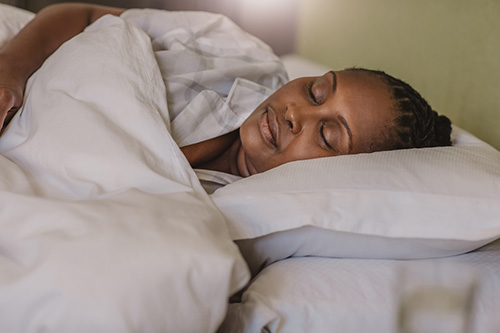By WHN Editorial Team
Causes of hot flashes and night sweats
Hot flashes and night sweats are among the most frustrating menopause symptoms because they come without warning and disrupt your life and your sleep. Women not only want to know what is going ON?!, they also wonder how to make the sweating stop.

What happens in a hot flash?
Science is still trying to sort out what’s going on when hot flashes occur. One likely scenario is that falling estrogen levels affect how much of the neurotransmitter serotonin is available in the hypothalamus. When estrogen falls, so does serotonin, and that triggers a cascade of signals in the brain that changes how the temperature-regulating area within your brain — the hypothalamus — perceives temperature, resulting in a false sensation of heat.
The hypothalamus is “tricked” into responding as if you’re overheating. It sends “cool-down” signals telling your blood vessels to dilate, your heart rate to increase, and your sweat glands to open up wide. The result is a sudden, intense — and unpleasant — rush of heat, often accompanied by drenching perspiration, dizziness, and even heart palpitations. You may also feel nauseated or weak, or have a crawling sensation on your skin.
Why do hot flashes and night sweats happen?
Hot flashes happen in menopause because it’s a time when the body is handling a lot of changes. Decreases in estrogen are a normal part of menopause, but when your body is trying to juggle a lot of demands — and isn’t getting enough support — its ability to compensate for unbalanced hormones is overwhelmed. The resulting hormonal imbalance can send false messages to your brain, telling it that you’re overheating and need to cool down (plus other unpleasant symptoms that may make matters worse!).
These hot flashes can happen at any time, day or night, and they’re often the first symptoms women notice as they approach the midlife transition in perimenopause. For many women, hot flashes and night sweats persist right through menopause. Women with hot flashes and night sweats often may experience related symptoms of hormonal imbalance, such as insomnia, anxiety, fatigue, and headaches.
Hot flashes are a wake-up call
While hot flashes and night sweats can literally wake you up, they’re also a way to alert you to a need for changes in your life — more sleep and relaxation, better diet, more exercise, and mindfulness. All the things your body needs for balance and health, it needs more of during the menopause transition.
Addressing other factors that contribute to hot flashes can help too:
- Certain foods like sugar, coffee, alcohol, fried and high-fat processed foods, and hot spices are known to trigger hot flashes in some women and should be avoided.
- On the other hand, Chinese medicine practitioners recommend “cooling foods” like apples and other non-citrus fruits, nuts, seeds, and fatty fish (full of omega-3 fatty acids), cooked dark leafy greens such as kale or spinach, and green tea — all of which are nutrient dense (and, in the case of green tea, can help you transition away from coffee without caffeine withdrawal).
- If you have high levels of anxiety, it can make you up to five times more likely to experience hot flashes and night sweats. Research has shown that mind-body practices to quiet anxiety, such as meditation, can reduce hot flashes.
- Exercise has been shown to improve the control and stability of the thermoregulatory system. In one study, hot flashes decreased by 60% in sedentary women who undertook a 4-month program of 45 minutes of moderate cardiovascular exercise five times a week. If you’re not able to take up jogging, jumping rope, or biking, start with gentle exercise such as yoga, stretching, or t’ai chi. These can help with both physical wellbeing and stress reduction.
What about HRT or a “magic pill” for hot flashes?
Today, the choice to use HRT (hormone replacement therapy) is a personal one, but it used to be conventional medicine’s go-to solution for menopausal symptoms. Now more women are experimenting with single-ingredient supplements from the drug store or so-called “magic pills” that don’t address the underlying problem of hormonal imbalance and cannot offer the lasting results that more comprehensive approaches do. For example, single herbs like black cohosh only work for a minority of women.
There are effective, natural options that work to restore balance to the three key hormones that fluctuate during perimenopause and menopause: estrogen, progesterone, and testosterone. These options offer the best long-term relief — without subjecting you to the known risks and frequent side effects of HRT.
A better solution — an approach with rich support for hot flash relief
When you reduce the demands being made on your body while increasing support, you will see a decrease in both the frequency and severity of your hot flashes and night sweats, and it will help relieve other symptoms of hormonal imbalance.
Our exclusive Herbal Equilibrium formula has helped tens of thousands of women find natural symptom relief by restoring hormonal balance naturally. In fact, 85% of our customers report significant improvement within 30 days or less.
“One day I was giving a speech…and the sweat was just pouring off me! My night sweats were so bad I literally would have to change the sheets in the middle of the night. Now, I’m having no symptoms, no night sweats — nothing.”
Lynnea, customer









